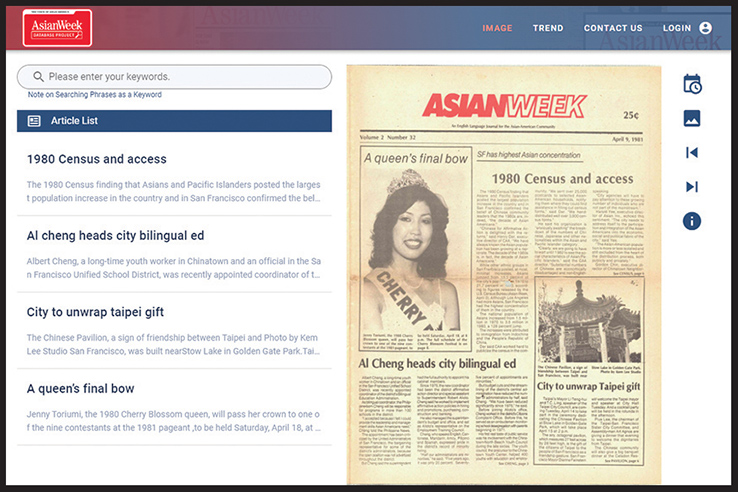‘AsianWeek’ Database Project | eReview
This database project offers free, comprehensive, unprecedented access to three decades of material about Asian Pacific American history, culture, politics, and news, all published in AsianWeek.
AsianWeek Database Project
CONTENT Founded by John Fang in 1979, San Francisco-based AsianWeek is considered the first and largest English-language print and digital publication serving Asian Pacific Americans. AsianWeek was published weekly from 1979 through 2009. In the wake of the 1965 Hart-Celler Immigration Act, which formally ended over 80 years of government-sanctioned race-based exclusion of Asian immigrants, the paper sought to give a voice to united Asian American communities. The AsianWeek Database Project, launched in the fall of 2023, offers free and full access to the publication’s three decades of material.
AsianWeek features a wide range of content covering activism, politics, immigration (including detailed coverage of U.S. Census results), education, local and national news, arts, entertainment, and more. Contributing writers and columnists included Emil Guillermo, whose award-winning series “Amok” discussed everything from racial justice to politics, entertainment, and sports; Tak Toyoshima, a freelance illustrator and creator of the comic strip “Secret Asian Man”; Phil Tajitsu Nash, who provided commentary on national politics and Asian American empowerment; film critic Philip W. Chung; and Tina Tsai, known as “L.A. Otaku Girl,” who covered anime, J-pop, and Japanese culture and traditions. AsianWeek’s regular features included an opinion section; the “Washington Journal” section, which focused on national and international news; a section devoted to Bay Area news and events; the “AskQ” advice column; and the “Picky Eater” and “AsianEats” columns, which featured Bay Area restaurant reviews.
USABILITY The AsianWeek database can be accessed by clicking the clearly marked “Explore Database” button on the homepage. This page also includes information on AsianWeek’s history, testimonials from prominent community members, and embedded videos from the “Words from Our Community” video series. Those new to the database may benefit from reviewing the database guide, which provides instruction on conducting basic and advanced searches, including searching by image, issue, and byline.
The database’s interface is straightforward. There are few bells and whistles, but the tools are intuitive and offer multiple points of entry. Researchers can easily access materials through the page preview tools on the right side of the page. Page preview tools allow users to select an issue, zoom in to view pages more closely, and navigate between pages.
The search box at the top of the page defaults to keyword searching; additional options are available in the advanced search box at the bottom right corner of the page. Here, users can limit by issue date (a single issue or a range of issues), author, tags, and keywords. A comprehensive pre-populated list of authors and tags makes it easy to navigate these fields; it is possible to select more than one author or tag when conducting any search. Somewhat surprisingly, author names are alphabetized by first name rather than last name, which can complicate queries if users don’t know the author’s first name. Manual entry may help researchers locate their desired terms, but this process is a bit awkward.
PRICING The AsianWeek Database Project is a freely available online resource.
VERDICT The AsianWeek Database Project offers unprecedented access to a vital publication focused on Asian Pacific American history, culture, politics, and news. While the platform is basic, the freely available content is singular and comprehensive.
I enjoyed this introduction to your AI conversation and will be looking forward to new articles on this important topic.
Add Comment :-
RELATED
ALREADY A SUBSCRIBER? LOG IN
We are currently offering this content for free. Sign up now to activate your personal profile, where you can save articles for future viewing










